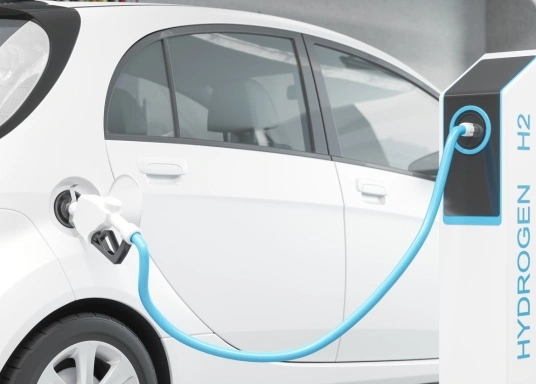Hydrogen fuel cell vehicles have become an increasingly popular concept over the last few years, as they represent a greener future for the automotive industry.
Although electric vehicles (“EVs”) are currently more accessible, they have some limitations that hydrogen vehicles can overcome. Both the UK Government and fuel distributors are investing in hydrogen technology and so it’s likely that these vehicles will soon become a more viable option for businesses as the infrastructure is improved.
In this guide, we’ll take a closer look into how hydrogen vehicles work and consider if they could benefit fleets that are looking for greener alternatives to petrol and diesel.
What is a hydrogen fuel cell vehicle?
Instead of being powered by electricity that is stored in a battery, hydrogen vehicles generate their electricity through a chemical reaction between hydrogen and oxygen in a fuel cell stack. This means that only water vapour is emitted from the tailpipe, making these vehicles free from carbon emissions and so are extremely beneficial for the environment.
Hydrogen vehicles share a lot of similarities with battery-electric vehicles as they’re almost silent to drive and have instant torque, however, they have a far longer range and are significantly faster to refuel.
Why is hydrogen the fuel of the future?
The sale of new petrol and diesel cars will be banned by 2030 and this has sparked debates about whether the fuel of the future will be battery-electric or hydrogen. Both have their advantages and limitations, however, hydrogen is increasingly being seen as the decarbonisation solution, particularly for HGVs.
Hydrogen vehicles have many benefits both for the environment and the drivers who use them. Some of the advantages of hydrogen vehicles are:
- Quick charging time. One of the main selling points of hydrogen vehicles is the charging time which is significantly faster than that of battery-electric vehicles. Hydrogen vehicles can be recharged in less than 5 minutes, making them extremely practical for drivers, such as couriers and taxi drivers, that need to be on the move quickly.
- Long driving range. Drivers that embark on long journeys will benefit from the long driving range of hydrogen vehicles as drivers can travel 300-500 miles before needing to refuel. This is significantly longer than a standard electric vehicle which is incapable of handling long-distance journeys.
- Clean source of energy. Hydrogen fuel cells do not generate greenhouse gas emissions, making them a far cleaner option than traditional combustion engines. This helps to limit pollution and improve air quality, plus allows businesses to reduce their carbon footprint.
- Cost-efficient. As they produce ultra-low emissions, hydrogen vehicles are classed in a low tax bracket, helping to save businesses money. Drivers will also not have to pay to enter clean air zones, so there are no limitations on where they can travel.
- Easily produced and readily available. Hydrogen is a uniquely abundant and renewable source of energy, so can easily be accessed to fuel vehicles. This makes it an ideal choice for businesses that are working towards a zero-carbon future.
What are the disadvantages of hydrogen vehicles?
Although significant progress has been made with hydrogen technology, there are still challenges that need to be overcome before it can be widely adopted by drivers. Some of the key issues with hydrogen vehicles are:
- Refuelling options. Hydrogen vehicles need to be refuelled at special fuel pumps and there are currently very few of these that are publicly available. Having a hydrogen vehicle is therefore not practical for many drivers as they’ll struggle to find locations where they can refuel.
- Hydrogen extraction. Hydrogen is an extremely abundant element; however, it needs to be extracted from water via electrolysis or separated from carbon fossil fuels. This requires a significant amount of energy which makes this an expensive process to carry out. In order to reduce overall costs, hydrogen needs to be developed at scale.
- Regulatory issues. There is currently very little legislation regarding hydrogen which can cause uncertainty about what regulations need to be followed and this makes it harder for commercial projects to predict their costs and revenue.
- Highly flammable. There are safety concerns about the use of hydrogen as it’s a highly flammable fuel source plus due to the high voltage, there is a risk of electric shocks.
- Costly to produce and purchase. Fuel cells require the use of precious metals, such as platinum and iridium, to act as a catalyst when producing hydrogen vehicles. These are expensive metals to mine and the high cost has deterred manufacturers from investing in hydrogen fuel cell technology. Due to the limited models that are available, hydrogen vehicles are more expensive than their battery-electric counterparts and so are not affordable for many businesses.
How likely are we to see hydrogen vehicles in the future?
Hydrogen certainly has a place in the future of fuel as it offers a greener alternative to petrol and diesel vehicles and will be more practical than EVs for drivers that travel long distances.
However, it’s undeniable that there are hurdles that need to be overcome before it can be a realistic option for the automotive industry. In order for the development of hydrogen vehicles to happen, investments will be needed from larger companies and governments to help improve the infrastructure and technology.
Although there are not many hydrogen vehicles on the roads yet, the technology and infrastructure are being developed so they’ll be more accessible to the wider population in the near future.
This transition has already begun as Element 2 has partnered with Exelby Services to open the UK’s first public hydrogen refuelling stations on the A1(M) and the M6. It’s expected that this will trigger further development of the hydrogen refuelling infrastructure with more sites hopefully being introduced across the country.
BP is looking to invest up to £18 billion into the UK fuel network with plans to develop up to 25 hydrogen refuelling stations across the UK by 2030. This will help to encourage businesses that are looking to transition to low-carbon, sustainable vehicles to consider hydrogen options for their fleets.
A wider selection of hydrogen models is predicted to enter the automotive market in the next few years with the production of hydrogen LCVs already underway. First Hydrogen is working with the Aggregated Hydrogen Freight Consortium (AHFC) to start real-world usage trials of hydrogen LCVs in early 2023.
The HGV sector is also on-board to look at hydrogen technology as a replacement for fossil fuels due to the long driving range it offers and the speed at which these vehicles can be recharged.
Discover our guide to hydrogen fuel.
Right Fuel Card is committed to helping businesses manage their fuel costs. We provide weekly invoices which can be accessed through our online account management system, making it simple for businesses to reclaim VAT on fuel. So that we can meet the needs of our customers, we are looking to introduce a wider range of fuel cards that reflect the different fuels that vehicles will be using in the next few years.
Businesses can explore our selection of fuel cards through our simple fuel card comparison tool or, if you’d like to discuss your options further, then our team can be contacted at 0113 202 5110.



